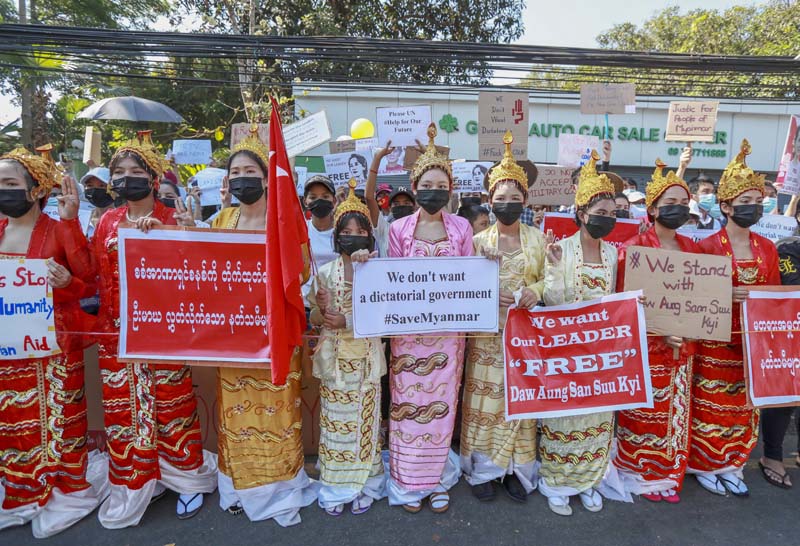

Groups of Myanmar’s many ethnic minorities marched behind their regional flags in one of the large protests on Thursday that displayed the broad opposition around the country to last week’s military takeover.
Resistance to the coup received a major boost from abroad from US President Joe Biden, who ordered new sanctions and promised more measures to come. “The military must relinquish power it seized and demonstrate respect for the will of the people,” he said.
Tens of thousands of protesters, if not more, have marched daily in Yangon and Mandalay, the country’s biggest cities. Large rallies also have been taking place in the capital, Naypyitaw, and many other cities and towns. Protesters have been ignoring emergency orders issued Monday banning rallies and gatherings of more than five people, for which the authorities have so far made relatively few arrests.
Participants have included factory workers, civil servants, students and teachers, medical personnel and others from all walks of life. Buddhist monks and Catholic clergy have been visible, as have LGBTQ contingents behind rainbow flags.
On Thursday in the southern city of Dawei, protesters stamped and wiped their feet on a poster of Senior Gen Min Aung Hlaing, the much-scorned coup leader who now heads the ruling junta.
Scores of wooden long boats used for fishing and transportation on scenic Inle Lake, a major tourist attraction in Shan State in eastern Myanmar, hosted a unique floating protest, with passengers holding placards denouncing the coup and calling for justice. Some protesters squeezed messages lengthwise onto oars, with slogans including ‘Respect Our Votes’ and ‘Say No to Coup’.
The protesters are demanding that power be restored to the elected government and that detained governing party officials, including ousted national leader Aung San Suu Kyi, be freed. About 200 politicians and activists have been arrested, according to the independent Assistance Association for Political Prisoners.
The junta has shown no signs of backing down and on Wednesday night arrested more senior members of Suu Kyi’s National League for Democracy party, along with other politicians and activists. The Irrawaddy, an online news site, said at least six senior NLD members were detained, including Kyaw Tint Swe, a top aide to Suu Kyi. It noted that the arrests came after NLD party executives began denouncing the coup in messages posted online.
Members of the state election commission who certified the landslide victory of Suu Kyi’s party in last November’s election were also reportedly taken from their homes.
The military said it carried out its February 1 takeover because of allegations the election was marred by irregularities, though the commission found no evidence to support them. The junta has formed a new commission to investigate the allegations and vows to turn over power to the winners of a new election after a one-year state of emergency.
The participation of ethnic minority marchers in Yangon, many dressed in the colorful traditional garb of their regions, underlined the depth and breadth of the opposition to last week’s coup.
While much attention has focused on protests in Myanmar’s major heartland cities, large daily protests have also taken place in the far-flung border areas home to minorities such as the Shan, the Karen, the Kachin, the Kayah and others. Ethnic minorities have long been the targets of repression by the military, which has used brutal counterinsurgency tactics to crush their decades-long aspirations for greater autonomy.
“Our people have been oppressed by the junta for many years. They have cracked down brutally. How long are they going to keep doing this?” said protester Naw Ohn Hla, a Karen human rights activist. “But the people understand the situation and most of them are joining now. Our aim is to abolish the 2008 constitution, get equal rights and form federal states.”
The military has not hesitated to employ force in big cities. It ruled directly for five decades after a 1962 coup, and used lethal force to quash a massive 1988 uprising and a 2007 revolt led by Buddhist monks.
International sanctions were employed by Western governments in reaction to those crackdowns, but they were eased when elections in 2010 and 2015 showed the country’s tentative steps toward democracy.
At the White House on Wednesday, Biden said he was issuing an executive order that will prevent Myanmar’s generals from accessing $1 billion in assets in the United States.
It remains to be seen what, if any, impact the US action will have on Myanmar’s military regime. Many of the military leaders are already under sanctions because of attacks against the Muslim Rohingya minority.